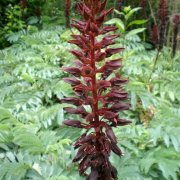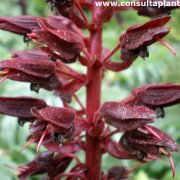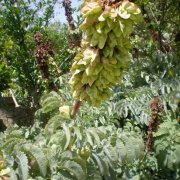Care of the shrub Melianthus major or Honey bush |
|
The genus Melianthus, family Melianthaceae, includes about 10 species of flowering plants native to southern Africa. Some species are: Melianthus major, Melianthus comosus, Melianthus minor, Melianthus elongatus. Common names: Honey flower, Honey bush, Giant honey flower. They are fast-growing evergreen shrubs that reach 3 meters (9.84 feet) in height. The attractive leaves are up to 40 cm (1.31 feet) in length and are bluish-green with silver tones. The flowers are maroon in color and arise on long erect spikes (up to 30 cm in length) above the foliage. They bloom in the second half of spring; in hot climates they can bloom again in autumn. Honey bush is used to form bushy groups, as isolated specimens, to cover slopes and in pots for patios and terraces. Melianthus major prefers full sun exposure but also grows in semi-shade. It resists occasional frosts down to -4 ºC (24.8 ºF). Water moderately throughout the year waiting for the substrate to dry. Honey flower resists well some days of drought. Giant honey flower prefers well-drained soil that contains abundant organic matter. Fertilize in winter with compost or manure and every 20 days with mineral fertilizer rich in potassium and sulfur during the flowering season. Prune flower stems and wilted leaves at the end of flowering; In early spring, prune intensively (almost to the base) to favor the appearance of new leaves. Melianthus major is a sensitive plant to the attack of the white fly and of fungi (if there is excess of humidity). Honey bush is propagated from seeds sown in autumn and by cuttings at any time of the year; it's common for new specimens to sprout next to the mother plants. |
Images of the shrub Melianthus major or Honey bush |
Find plants
Melianthus major or Honey bush | Care and Growing
© 2026 FavThemes





